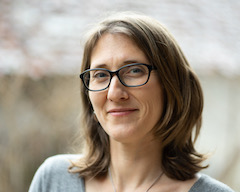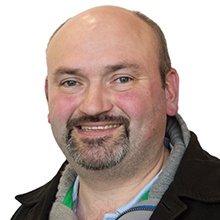Invited speakers
Invited speakers
 |
|
| Chloé-Agathe Azencott is an assistant professor of the Centre for Computational Biology (CBIO) of MINES ParisTech and Institut Curie (Paris, France). She earned her PhD in computer science at University of California, Irvine (USA) in 2010, working at the Institute for Genomics and Bioinformatics. She then spent 3 years as a postdoctoral researcher in the Machine Learning and Computational Biology group of the Max Planck Institutes in Tübingen (Germany) before joining CBIO. Her research revolves around the development and application of machine learning methods for biomedical research, with particular interest for feature selection and the integration of structured information. She currently holds funding from ANR (Jeune Chercheur Jeune Chercheuse project SCAPHE) and ERC (Inovative Training Network MLFPM). She is also the co-founder of the Parisian branch of Women in Machine Learning and Data Science. |
 |
|
Alexander Bockmayr is a full professor at the Department of Mathematics and Informatics of Freie Universität Berlin since 2004. He holds the chair for Mathematics in Life Sciences.
From 1998 to 2004 he was a professor at Lorraine University, Nancy, and head of the MODBIO (Computational Models in Molecular Biology) project-team at LORIA and INRIA. His current research focuses on mathematical and computational methods for molecular systems biology. The main topics of interest are metabolic and regulatory networks. Special emphasis is on constraint-based methods, i.e., reasoning with constraints, where each constraint represents a piece of partial information on the structure or dynamics of the network under study. His mathematical background lies in discrete mathematics and optimisation, constraint and integer programming, and computational logic. |
 |
|
| Alessandra Carbone is Professor of Computer Science at Sorbonne Université, she leads the Analytical Genomics team since 2003 and is the director of the Department of Computational and Quantitative Biology since 2009. Her group works on computational problems concerning the functioning and evolution of biological systems. Mathematical methods coming from statistics and combinatorics, as well as algorithmic tools are employed to study fundamental principles of the cellular functioning starting from genomic, metagenomic and structural data. The projects are all aimed at understanding the basic principles of evolution and co-evolution of molecular structures in the cell. |
|

|
|
|
Christophe Dessimoz obtained his Master in Biology (2003) and PhD in Computer Science (2009) from ETH Zurich, Switzerland. After a postdoc at the European Bioinformatics Institute near Cambridge (UK), he joined University College London as lecturer (2013), then Reader (2015). In 2015, he joined the University of Lausanne as SNSF professor, retaining an appointment at UCL, where part of his lab remains active. Since 2016, Christophe is also a group leader at the Swiss Institute of Bioinformatics. At the interface of biology and computer science, Christophe’s lab seeks to better understand evolutionary and functional relationships between genes, genomes and species. His lab develops and maintains the OMA (Orthology Matrix) resource. He is cautious proponent of a "Big Data” approach to bioinformatics.
|

|
|
| Juliette Martin received her PhD in 2005 from University Paris 7, working at the Mathématiques Informatique et Génome Unit at INRA, Jouy-en-Josas. After a first post-doc in Paris at INSERM/Paris 7 and a second post-doc at the Indian Institute of Science in Bangalore, she joined the CNRS in Lyon as a full-time researcher in 2008. Her research focuses on the structural bioformatics of protein-protein interactions: prediction of interactions and interaction sites via information gained from structures. |
 |
|
| Olivier Delaneau is currently a SNSF professor in the department of Computational Biology of the University of Lausanne. His research focuses on two main topics. First, he aims at better characterizing the molecular mechanisms underlying the genetic variations that affect the expression of genes (aka eQTLs). To do so, his group analyses large population scale genomic datasets regrouping genetic variations, expression of genes (measured using RNA-seq) and activity of regulatory elements (measured using ChIP-seq). This part of his research largely relies on network modeling and causal inference. Second, he also aims at improving methods for the imputation of genotypes and haplotypes from large scale genomic data sets (aka as imputation). To do so, his group develops fast and accurate statistical methods, usually based on Hidden Markov Models, and applies them on the large genomic data sets regrouping hundreds of thousands of genomes. In 2008, he obtained a PhD in bioinformatics from the Conservatoire National des Arts et Métiers (CNAM) in Paris and went through two successive postdocs between 2009 and 2018; in the department of Statistics of the University of Oxford (UK) and in the department of Genetic Medicine and Development of the University of Geneva (Switzerland). Through the last ten years, he developed widely used genomics software packages such as SHAPEIT, FastQTL and QTLtools that were in large scale projects such as 1000 Genomes, Haplotype Reference Consortium, UK Biobank and GTEx. |
IFB (Elixir-FR) invited speaker
 |
|
| Dr Guy Cochrane leads the European Nucleotide Archive (ENA), a platform for the management, sharing, integration and dissemination of sequence data. ENA includes, on the technical side, core databasing infrastructure for the rapid archiving of petabytes of sequence data, submission/validation services used by several 1000s of data providers, and sophisticated data discovery and retrieval tools used by many times this number. On the content side, ENA offers extensive public domain data from over 2 million species. Providing the European node of the celebrated long-standing International Nucleotide Sequence Database Collaboration, Cochrane is an authority on large-scale international sequence data sharing across application areas and taxonomies. Within his current portfolio of projects, for example, his team leads on data coordination across marine, pathogen and livestock data coordination. Cochrane has driven numerous developments within sequencing informatics, notably data standards; global next generation sequence data infrastructure; CRAM sequence data compression software; the data hub and portal system; and most recently tools and services for data brokering. |
|